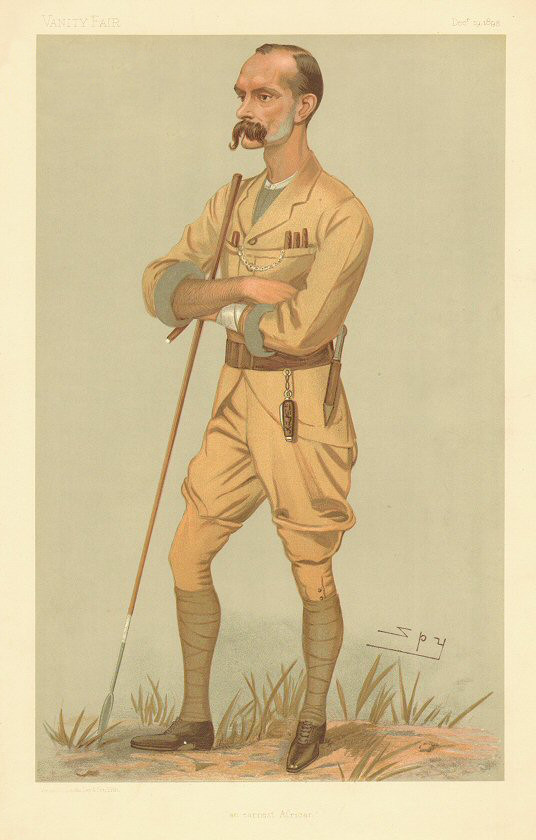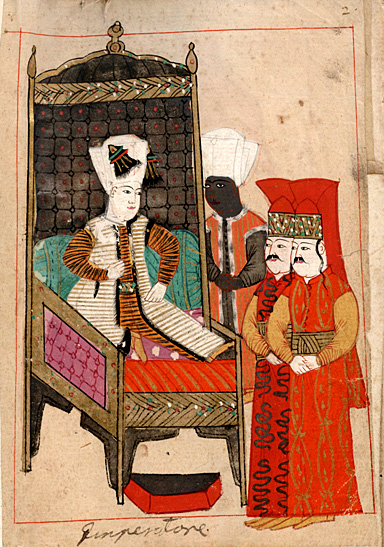|
Muhammadu Maiturare
Muhammadu Maiturare ( ar, محمد مايتوراري) was Sultan of Sokoto from 1915 until his death in 1924. He was a descendant of Abu Bakr Atiku, and son of Sultan Ahmadu Atiku; his mother was a daughter of a Tuareg chief. Life Prior to becoming Sultan, Maiturare held the title of Marafa Gwadabawa and was a member of the traditional committee that elected Muhammadu Attahiru II, Lugard's choice for the post of Sultan. Maiturare was notable for developing the district of Gwadabawa in Sokoto. He was also noted as an effective military leader who pacified the area north of Sokoto which had been raided frequently by the Kebbawa.Joseph P. Smaldone. Firearms in the Central Sudan: A Revaluation The Journal of African History, Vol. 13, No. 4 (1972), pp. 591-607 On June 19, 1915, Maiturare was elected by the Sokoto traditional council as the successor to Muhammadu Attahiru II Muhammadu Attahiru II ( ar, محمد الطاهر الثاني) was the thirteenth Sultan of the Sokoto Calip ... [...More Info...] [...Related Items...] OR: [Wikipedia] [Google] [Baidu] |
Muhammadu Attahiru II
Muhammadu Attahiru II ( ar, محمد الطاهر الثاني) was the thirteenth Sultan of the Sokoto Caliphate from 1903 to 1915. Attahiru II was the great grandson of Usman dan Fodio, the founder of the Sokoto Caliphate and son of Ali Babba bin Bello, the fourth Sultan. Upon the death of the eleventh sultan Abderrahman dan Abi Bakar in 1902, Attahiru II was the primary challenger to the candidacy of Muhammadu Attahiru I, with the later being selected as the Sultan. After losing this selection to Attahiru I, it is claimed that Attahiru II became largely uninterested in the affairs of the Caliphate. In 1903, British forces conquered Sokoto leading Attahiru I to flee from the city with many supporters. British Commander Frederick Lugard appointed Muhammadu Attahiru II the new Sultan of Sokoto on March 21, 1903. However, at the same time Lugard stripped much of the political power of the office of Sultan. Attahiru's reign consisted of balancing his need to both serve the p ... [...More Info...] [...Related Items...] OR: [Wikipedia] [Google] [Baidu] |
Muhammadu Tambari
Muhmmadu Tambari CMG reigned as Sultan of Sokoto from 1924 to 1931, he was deposed in 1931. Tambari was the son of Muhammadu Maiturare Muhammadu Maiturare ( ar, محمد مايتوراري) was Sultan of Sokoto from 1915 until his death in 1924. He was a descendant of Abu Bakr Atiku, and son of Sultan Ahmadu Atiku; his mother was a daughter of a Tuareg chief. Life Prior to becom .... Life Prior to his selection as Sultan, Tambari was the Sarkin Gobir of Gwadabawa; his selection as Sultan was influenced by the Lieutenant Governor, William Gowers and Webster, the British resident in Sokoto. Tambari's major competitor was Hassan, Sarkin Barau of Dange who was eleven years older than Tambari and who was the preferred choice of the Sokoto traditional council led by Waziri Maccido. However, the masses were indifferent to the choice of Tambari over Hassan, Tambari's father was respected for his kindness and they hoped his son will be kind like his father. During his reign, he did ... [...More Info...] [...Related Items...] OR: [Wikipedia] [Google] [Baidu] |
Ahmadu Atiku
Ahmadu Atiku ( ar, أحمد عتيكو) (c. 1807–1866) also known as Ahmadu Zarruku was Sultan of Sokoto from 1859 to 1866. Prior to becoming Sultan, he was head of the Abu Bakr Atiku branch of Uthman Dan Fodio's family and held the title of Sarkin Zamfara with responsibilities for Sokoto town and south-east Sokoto. Atiku established the military settlement (ribat) at Chimmola which was across the valley from the town of Wurno and which he used as the seat of government. Life Atiku was born c. 1807, he was chosen as Sultan in 1859 in succession to Ali Bello. Bello was sufficiently successful in battle and was a respected ruler; at the time of Atiku's accession, Sokoto was fully established. He was selected over Ali Karami, the Sarkin Gobir, Isa and Umar Buhari, a grandson of Uthman Dan Fodio. Atiku continued the consolidation efforts of Ali Bello, he established the ribats or settlements of Moriki, Boko and Birnin Kaya in old Zamfara and the settlement of Chafe, south east of S ... [...More Info...] [...Related Items...] OR: [Wikipedia] [Google] [Baidu] |
Sultan Of Sokoto
Sultan (; ar, سلطان ', ) is a position with several historical meanings. Originally, it was an Arabic abstract noun meaning "strength", "authority", "rulership", derived from the verbal noun ', meaning "authority" or "power". Later, it came to be used as the title of certain rulers who claimed almost full sovereignty (i.e., not having dependence on any higher ruler) without claiming the overall caliphate, or to refer to a powerful governor of a province within the caliphate. The adjectival form of the word is "sultanic", and the state and territories ruled by a sultan, as well as his office, are referred to as a sultanate ( '. The term is distinct from king ( '), despite both referring to a sovereign ruler. The use of "sultan" is restricted to Muslim countries, where the title carries religious significance, contrasting the more secular ''king'', which is used in both Muslim and non-Muslim countries. Brunei and Oman are the only independent countries which retain the tit ... [...More Info...] [...Related Items...] OR: [Wikipedia] [Google] [Baidu] |
Abu Bakr Atiku
Abu Bakr Atiku ( ar, أبو بكر أتيكو; 1782–1842) was the third Sultan of the Sokoto Caliphate, reigning from October 1837 until November 1842. Early years Abu Bakr Atiku dan Shehu was born to the second wife of Usman dan Fodio in 1782. He was involved, as were all his siblings, in studies directed by his father in Degel until the family and some followers were exiled in 1804. Like his brother Muhammed Bello and his sister Nana Asma’u, he dedicated significant part of his early years to study and wrote poetry, history, and on Islamic studies. Many of his works of history and poetry survive and are considered key texts of the era. In 1815, when Usman dan Fodio died, he briefly contested his brother Muhammed Bello for control of the Sokoto Caliphate. The bloodless succession struggle ended with Bello the Sultan of the Caliphate and Atiku imprisoned for one year. When he was released, he became and adviser to Mohammed Bello for the remainder of Bello's life. S ... [...More Info...] [...Related Items...] OR: [Wikipedia] [Google] [Baidu] |
Tuareg
The Tuareg people (; also spelled Twareg or Touareg; endonym: ''Imuhaɣ/Imušaɣ/Imašeɣăn/Imajeɣăn'') are a large Berber ethnic group that principally inhabit the Sahara in a vast area stretching from far southwestern Libya to southern Algeria, Niger, Mali, and Burkina Faso. Traditionally nomadic pastoralists, small groups of Tuareg are also found in northern Nigeria. The Tuareg speak languages of the same name (also known as ''Tamasheq''), which belong to the Berber branch of the Afroasiatic family. The Tuaregs have been called the "blue people" for the indigo dye coloured clothes they traditionally wear and which stains their skin. They are a semi-nomadic people who practice Islam, and are descended from the indigenous Berber communities of Northern Africa, which have been described as a mosaic of local Northern African (Taforalt), Middle Eastern, European (Early European Farmers), and Sub-Saharan African-related ancestries, prior to the Arab expansion. Tuareg people a ... [...More Info...] [...Related Items...] OR: [Wikipedia] [Google] [Baidu] |
Lord Lugard
Frederick John Dealtry Lugard, 1st Baron Lugard (22 January 1858 – 11 April 1945), known as Sir Frederick Lugard between 1901 and 1928, was a British soldier, mercenary, explorer of Africa and colonial administrator. He was Governor of Hong Kong (1907–1912), the last Governor of Southern Nigeria Protectorate (1912–1914), the first High Commissioner (1900–1906) and last Governor (1912–1914) of Northern Nigeria Protectorate and the first Governor-General of Nigeria (1914–1919). Early life and education Lugard was born in Madras (now Chennai) in India, but was brought up in Worcester, England. He was the son of the Reverend Frederick Grueber Lugard, a British Army chaplain at Madras, and his third wife Mary Howard (1819–1865), the youngest daughter of Reverend John Garton Howard (1786–1862), a younger son of landed gentry from Thorne and Melbourne near York. His paternal uncle was Sir Edward Lugard, Adjutant-General in India from 1857 to 1858 and Permanent Und ... [...More Info...] [...Related Items...] OR: [Wikipedia] [Google] [Baidu] |
1924 Deaths
Nineteen or 19 may refer to: * 19 (number), the natural number following 18 and preceding 20 * one of the years 19 BC, AD 19, 1919, 2019 Films * ''19'' (film), a 2001 Japanese film * ''Nineteen'' (film), a 1987 science fiction film Music * 19 (band), a Japanese pop music duo Albums * ''19'' (Adele album), 2008 * ''19'', a 2003 album by Alsou * ''19'', a 2006 album by Evan Yo * ''19'', a 2018 album by MHD * ''19'', one half of the double album '' 63/19'' by Kool A.D. * '' Number Nineteen'', a 1971 album by American jazz pianist Mal Waldron * ''XIX'' (EP), a 2019 EP by 1the9 Songs * "19" (song), a 1985 song by British musician Paul Hardcastle. * "Nineteen", a song by Bad4Good from the 1992 album ''Refugee'' * "Nineteen", a song by Karma to Burn from the 2001 album ''Almost Heathen''. * "Nineteen" (song), a 2007 song by American singer Billy Ray Cyrus. * "Nineteen", a song by Tegan and Sara from the 2007 album '' The Con''. * "XIX" (song), a 2014 song by ... [...More Info...] [...Related Items...] OR: [Wikipedia] [Google] [Baidu] |
Sultans Of Sokoto
Sultan (; ar, سلطان ', ) is a position with several historical meanings. Originally, it was an Arabic abstract noun meaning "strength", "authority", "rulership", derived from the verbal noun ', meaning "authority" or "power". Later, it came to be used as the title of certain rulers who claimed almost full sovereignty (i.e., not having dependence on any higher ruler) without claiming the overall caliphate, or to refer to a powerful governor of a province within the caliphate. The adjectival form of the word is "sultanic", and the state and territories ruled by a sultan, as well as his office, are referred to as a sultanate ( '. The term is distinct from king ( '), despite both referring to a sovereign ruler. The use of "sultan" is restricted to Muslim countries, where the title carries religious significance, contrasting the more secular ''king'', which is used in both Muslim and non-Muslim countries. Brunei and Oman are the only independent countries which retain the tit ... [...More Info...] [...Related Items...] OR: [Wikipedia] [Google] [Baidu] |



